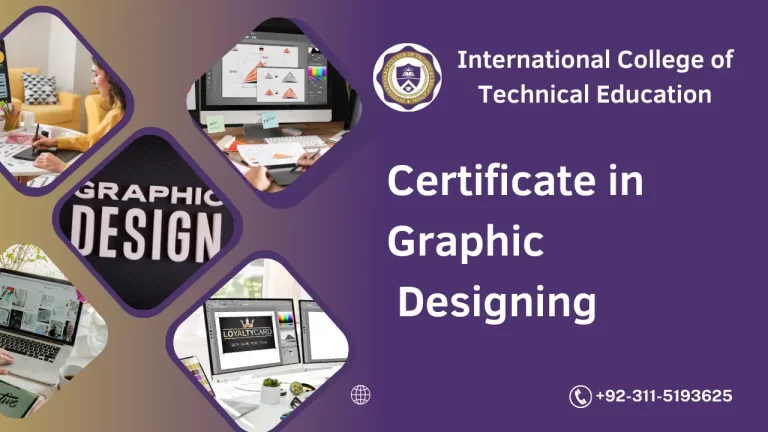The Diploma in Information Technology (DIT) is a comprehensive program designed to provide students with a solid foundation in various aspects of information technology. This diploma equips students with the necessary skills and knowledge to excel in the rapidly evolving field of IT. The course covers a wide range of topics, from programming and software development to network management and cybersecurity. Whether you are a beginner looking to start a career in IT or a professional seeking to enhance your skills, this course offers an ideal platform to achieve your goals.
Course Benefits:
- Practical Skills: The DIT program focuses on hands-on learning, ensuring that students gain practical skills that are directly applicable in the IT industry.
- Industry-Relevant Curriculum: The curriculum is carefully crafted to align with the latest industry trends, technologies, and best practices, ensuring graduates are job-ready.
- Diverse Career Opportunities: Information technology is a broad field with a wide range of career paths. Graduates can pursue roles such as software developer, IT consultant, network administrator, database analyst, and more.
- Strong Foundation: The course provides a strong foundation in programming, networking, databases, and cybersecurity, which serves as a solid basis for further specialization.
- Flexibility: Whether you’re a full-time student or a working professional, the DIT program offers flexible study options to suit your schedule.
Course Learning Outcomes:
By the end of the course, students will be able to:
- Demonstrate proficiency in programming languages commonly used in software development.
- Understand and implement effective network management techniques.
- Design and manage databases, ensuring efficient data storage and retrieval.
- Analyze security risks and implement strategies to protect digital assets.
- Develop and deploy software applications that meet industry standards.
- Troubleshoot hardware and software issues effectively.
- Apply critical thinking and problem-solving skills to IT-related challenges.
- Communicate technical concepts clearly to both technical and non-technical audiences.
Course Study Units:
- Introduction to Information Technology:
- Overview of IT concepts and terminology.
- Historical evolution of computing.
- Role of IT in various industries.
- Programming Fundamentals:
- Basics of programming languages (Python, Java, C++).
- Variables, data types, and control structures.
- Object-oriented programming concepts.
- Networking and Infrastructure:
- Fundamentals of computer networks.
- Network protocols and communication.
- Network administration and troubleshooting.
- Database Management:
- Relational database concepts.
- SQL querying and database design.
- Data normalization and integrity.
- Web Development:
- Front-end and back-end development.
- HTML, CSS, JavaScript.
- Introduction to web frameworks.
- Cybersecurity Basics:
- Common cybersecurity threats and vulnerabilities.
- Security protocols and encryption.
- Implementing security best practices.
- Software Development Lifecycle:
- Phases of software development.
- Version control and collaborative coding.
- Software testing and debugging.
- IT Project Management:
- Project planning and scope definition.
- Resource allocation and risk management.
- Monitoring project progress.
Entry Requirements:
To enroll in the DIT program, candidates must meet the following requirements:
- High school diploma or equivalent.
- Basic understanding of computer operations and mathematics.
- Proficiency in English (verbal and written).
Future Progressions:
Upon successful completion of the Diploma in Information Technology program, graduates will have several options for future progression:
- Employment: Graduates can pursue entry-level positions in IT departments of various industries, including software development firms, IT consulting companies, and more.
- Higher Education: The diploma serves as a pathway to further education. Graduates can pursue bachelor’s degrees in computer science, information technology, or related fields to deepen their knowledge and skills.
- Certifications: Graduates can obtain industry-recognized certifications in specific IT domains, such as CompTIA A+, Cisco CCNA, Microsoft Certified: Azure Fundamentals, and more.
- Specialization: With a strong foundation in IT, individuals can specialize in areas like cybersecurity, data science, artificial intelligence, or web development, catering to their interests and market demand.
Conclusion:
The Diploma in Information Technology offers a comprehensive curriculum that equips students with the skills needed to thrive in the dynamic IT landscape. With practical learning experiences, industry relevance, and diverse career opportunities, this program is an excellent choice for anyone looking to embark on a rewarding journey in the field of information technology. Whether you’re new to the field or seeking to upgrade your skills, the DIT program provides a solid stepping stone towards a successful IT career.






